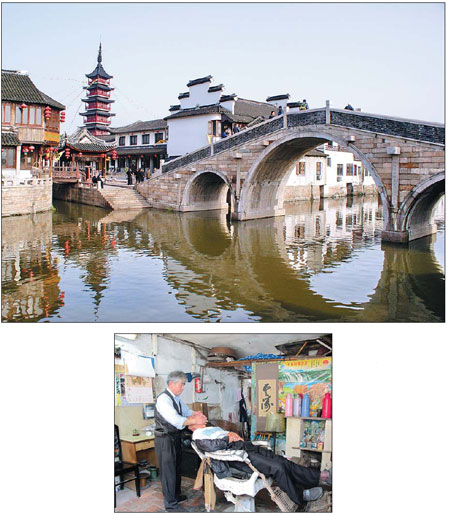Relief from the madding crowds
Updated: 2013-04-06 08:07
By Xu Junqian (China Daily)
|
||||||||
|
Top: Qinfeng Pagoda has stood at the center of Qiandeng Town for 1,500 years. Jing Wei / for China Daily Above: A traditional shave in the ancient town. Xu Xiaomin / China Daily |
Qiandeng Town, Kunshan - 63 km from Shanghai
The historical Yangtze River Delta is known for its ancient towns, mostly water towns, where busy urbanites go to experience a slower pace of life. The small, 2,500-year-old Qiandeng Town in Jiangsu province really does offer some relaxing time out from the city, as unlike some of others it is not yet commercialized and it has managed to escape the hordes of tourists that disturb the peace in the other ancient towns.
Qiandeng offers an authentic water-town atmosphere, with its chessboard layout of paved roads and canals. The Qinfeng Pagoda, which is also called the "beauty pagoda" because of its graceful, slender figure, has stood at the center of town for 1,500 years, withstanding storms and war as well as the passing of time.
After years of restoration, the pagoda is now open to the public and as well as offering some lovely panoramic views of the town it is also home to one of the world's largest jade reclining Buddhas. Newly produced and shipped from Myanmar, the statue is 8.9 meters in length and 32 tons in weight.
The petite town is also home one of the oldest and longest and best preserved slab stone streets in East China. Consisting of 2,072 stone slabs, the 800-meter street boasts such a surprisingly effective drainage system that even after a heavy downpour, there are few pools of water on the street.
The town's most famous son is Gu Yanwu, a renowned thinker and scholar of the late Ming Dynasty (1368-1644) who famously said "everyone should be responsible for the rise and fall of his country". Today his former residence is one of the town's main attractions.
It takes about an hour to get to Qiandeng by car from Shanghai. While there are few restaurants and cafes, the ones there are offer rustic east China cuisine at a reasonable price. After lunch you can spend the afternoon taking a relaxing boat trip or enjoy a Kunqu Opera performance in one of the teahouses.
Accommodation is limited and mostly low budget.

 'Taken 2' grabs movie box office crown
'Taken 2' grabs movie box office crown
 Rihanna's 'Diamonds' tops UK pop chart
Rihanna's 'Diamonds' tops UK pop chart
 Fans get look at vintage Rolling Stones
Fans get look at vintage Rolling Stones
 Celebrities attend Power of Women event
Celebrities attend Power of Women event
 Ang Lee breaks 'every rule' to make unlikely new Life of Pi film
Ang Lee breaks 'every rule' to make unlikely new Life of Pi film
 Rihanna almost thrown out of nightclub
Rihanna almost thrown out of nightclub
 'Dark Knight' wins weekend box office
'Dark Knight' wins weekend box office
 'Total Recall' stars gather in Beverly Hills
'Total Recall' stars gather in Beverly Hills
Most Viewed
Editor's Picks

|

|

|

|

|

|
Today's Top News
Boston bombing suspect reported cornered on boat
7.0-magnitude quake hits Sichuan
Cross-talk artist helps to spread the word
'Green' awareness levels drop in Beijing
Palace Museum spruces up
First couple on Time's list of most influential
H7N9 flu transmission studied
Trading channels 'need to broaden'
US Weekly

|

|








